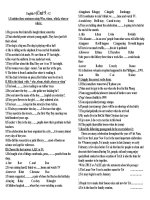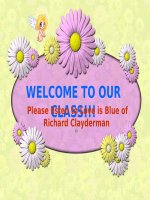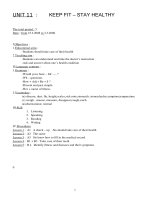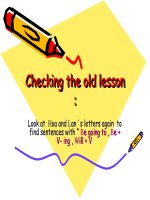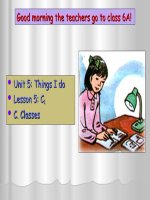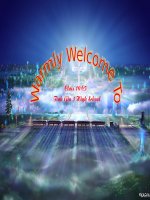unit 6
Bạn đang xem bản rút gọn của tài liệu. Xem và tải ngay bản đầy đủ của tài liệu tại đây (3.25 MB, 39 trang )
<span class='text_page_counter'>(1)</span>
<span class='text_page_counter'>(2)</span>
<span class='text_page_counter'>(3)</span> Unit Six:. Period 37. Lesson One:. Getting started Listen and read.
<span class='text_page_counter'>(4)</span> Unit 6: The environment Lesson 1: Getting started & Listen and read.
<span class='text_page_counter'>(5)</span> Getting started Listen and read. I. Pre-reading.
<span class='text_page_counter'>(6)</span> Getting started Listen and read. I. Pre-reading 1.Vocabulary:.
<span class='text_page_counter'>(7)</span>
<span class='text_page_counter'>(8)</span> Getting started Listen and read. I. Pre-reading 1.Vocabulary:. Deforestation (n):. Sự tàn phá rừng.
<span class='text_page_counter'>(9)</span>
<span class='text_page_counter'>(10)</span> Getting started Listen and read. I. Pre-reading 1.Vocabulary:. Deforestation (n): Garbage dump (n):. Sự tàn phá rừng Bãi đổ rác thải.
<span class='text_page_counter'>(11)</span>
<span class='text_page_counter'>(12)</span> Getting started Listen and read. I. Pre-reading 1.Vocabulary:. Deforestation (n): Garbage dump (n): Dynamite fishing (n):. Sự tàn phá rừng Bãi đổ rác thải. Việc đánh bắt cá bằng thuốc nổ.
<span class='text_page_counter'>(13)</span>
<span class='text_page_counter'>(14)</span> Getting started Listen and read. I. Pre-reading 1.Vocabulary:. Deforestation (n): Garbage dump (n): Dynamite fishing (n):. Sự tàn phá rừng Bãi đổ rác thải. Việc đánh bắt cá bằng thuốc nổ. Spraying pesticides (n): Việc phun thuốc diệt sâu bọ.
<span class='text_page_counter'>(15)</span>
<span class='text_page_counter'>(16)</span> Getting started Listen and read. I. Pre-reading 1.Vocabulary:. Deforestation (n): Garbage dump (n): Dynamite fishing (n):. Sự tàn phá rừng Bãi đổ rác thải. Việc đánh bắt cá bằng thuốc nổ. Spraying pesticides (n): Việc phun thuốc diệt sâu bọ Sewage (n):. Nước thải, nước cống.
<span class='text_page_counter'>(17)</span> Matching: 1. deforestation 2. garbage dump. 3. spraying pesticides 5. sewage. (a). (d). 6. air pollution. 4. dynamite fishing. 7. water pollution. (b). (e). (c). (f). (g).
<span class='text_page_counter'>(18)</span>
<span class='text_page_counter'>(19)</span> Match the names in column A with the tasks in column B. Then write the full sentences. A B a) collect all the bags and take them to the garbage dump. 2. Group 2 b) check among the rocks. c) provide a picnic lunch for 3. Group 3 everyone. 4. Mr. Jones d) give out the bags. 5. Mrs. Smith e) check the sand. 6. Mr. Brown f) walk along the shore. 1. Group 1. 1-f. 2-e. 3-b. 4-a. 5-c. 6-d.
<span class='text_page_counter'>(20)</span> Write the specific tasks..
<span class='text_page_counter'>(21)</span> * The full sentences: 1. Group 1 walks along the shore. 2. Group 2 checks the sand. 3. Group 3 checks among the rocks. 4. Mr Jones collects all the bags and takes them to the garbage dump. 5. Mrs. Smith provides a picnic lunch for everyone. 6. Mr. Brown gives out the bags..
<span class='text_page_counter'>(22)</span>
<span class='text_page_counter'>(23)</span> 2 7. 5. 3 4. Lucky. 1. 8 continues.
<span class='text_page_counter'>(24)</span> Who are the listeners? The listeners are the volunteer conservationists . Answer key.
<span class='text_page_counter'>(25)</span> Where are they? They are on the beach. Answer key.
<span class='text_page_counter'>(26)</span> Who is the speaker? The speaker is Mr. Brown . Answer key.
<span class='text_page_counter'>(27)</span> What are they going to do?. They are going to clean the beach. Answer key.
<span class='text_page_counter'>(28)</span>
<span class='text_page_counter'>(29)</span> If the pollution continues, what might happen?. If the pollution continues, the environment might not be fresh, then our life will be damaged . Answer key.
<span class='text_page_counter'>(30)</span>
<span class='text_page_counter'>(31)</span> Getting started Listen and read I. Pre-reading 1.Vocabulary 2. Open prediction. II. Whilereading 1.Reading and Checking 2. Matching 3. Lucky numbers III. Postreading.
<span class='text_page_counter'>(32)</span> Getting started Listen and read I. Pre-reading 1.Vocabulary 2. Open prediction. <<. What do you do to protect the environment?>>. II. Whilereading 1.Reading and - cleaning the school yards . Checking - cleaning the streets / roads / parks. 2. Matching 3. Lucky numbers III. Postreading * Discussion. - planting trees / flowers / grass. - keeping the water clean: not throw garbage into rivers / lakes. - putting garbage in gabrage bins.. - collecting bottles / cans / used paper to recycle them..
<span class='text_page_counter'>(33)</span> The environment is polluted.
<span class='text_page_counter'>(34)</span> Plant more green trees.
<span class='text_page_counter'>(35)</span> Clean the street by collecting garbage.
<span class='text_page_counter'>(36)</span> Put garbage in garbage bins.
<span class='text_page_counter'>(37)</span> Plant flowers and grass.
<span class='text_page_counter'>(38)</span> homework. * Write a paragraph of 60 - 80 words about the environmental problems in Viet Nam. * Do exercise 1, 2 on page 41, 42 in the workbook. * Prepare the parts Speak & Listen..
<span class='text_page_counter'>(39)</span>
<span class='text_page_counter'>(40)</span>

